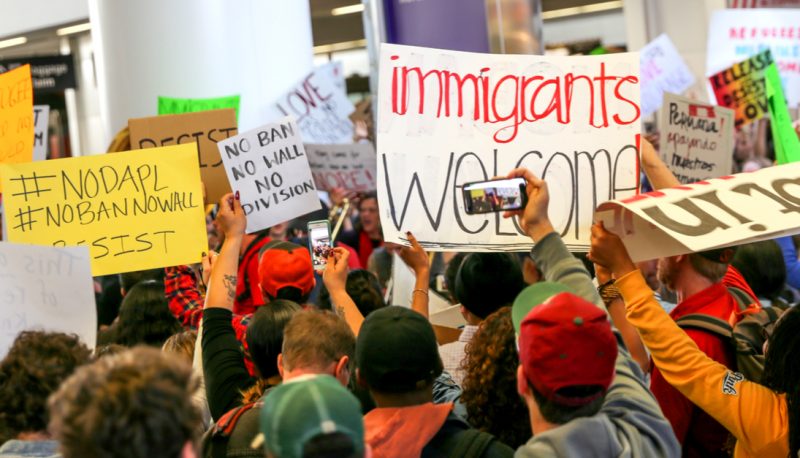President Trump’s Muslim ban is scheduled to be back before the Supreme Court on April 25. This case represents Trump’s third attempt to ban immigration from Muslim-majority countries, and it is still an unconstitutional affront to core American values. As People For the American Way Foundation and thirteen organizational allies noted in a friend-of-the-court brief, the anti-Muslim hate behind Muslim Ban 3.0 has not only endangered Muslim lives and inhibited their religious freedom, but it has also harmed our society as a whole. Our brief’s introduction and an outline of our arguments follow below. PFAW Foundation was also party to a brief filed against Muslim Ban 2.0 and swiftly condemned Muslim Ban 1.0.
Download a PDF copy of the full brief
Summary of Argument
In promotion of their interests, Amici respectfully submit this brief to advance a key argument in support of affirming the lower courts’ rulings granting the plaintiffs’ request for injunctive relief. Amici submit that the balance of equities and public interest weigh heavily in favor of enjoining President Trump’s September 24, 2017 Executive Order, “Enhancing Vetting Capabilities and Processes for Detecting Attempted Entry into the United States by Terrorists or Other Public-Safety Threats” (the “Executive Order”), because it improperly promotes social categorization and stereotyping that endangers the lives and well-being of individuals of the Muslim faith. The Executive Order is the product of several centuries of Muslim stereotyping in this country, and harms even those who are not the direct victims of specific attacks on immigrants. Here, the evidence demonstrates that, regardless of the Government’s post-hoc explanations, the Executive Order was motivated by animus toward Muslims and improperly singled out, as a proxy, those born in the targeted majority-Muslim countries.
Argument
Social Categorization and Stereotyping Create Dangerous Conditions for Members of Minority Groups
A. Stereotyping Minorities Creates a Climate for Discrimination
B. The Executive Order Is the Product of Centuries of Discriminatory Stereotypes About Muslims
C. The Executive Order Is Based on Stereotypes About Muslims as “Anti-American” and “Terrorists”
D. Government Legitimization of Muslim Stereotypes Has Encouraged Violence Against Muslims, and Inhibited Millions of Muslims in the Practice of Their Religion
- Government Stereotyping Leads to Violence and Discrimination
- The President’s Statements Have Encouraged Violence
- Stereotyping and Discrimination Harms All Americans, Not Just Those Directly Affected by Specific Acts
CONCLUSION
For the foregoing reasons, and those set forth in the briefs of the Respondents, Amici Curiae respectfully request that this Court affirm the judgments of the lower courts enjoining the Executive Order.
